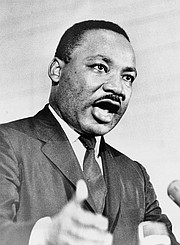The lessons
4/6/2018, 12:12 p.m.
Memories of the life and lessons of Dr. Martin Luther King Jr. are flooding back this week as the national media and groups across the nation remember the young Baptist minister who died 50 years ago on April 4, 1968.
Before the 39-year-old Dr. King was gunned down by an assassin’s bullet in Memphis, Tenn., he inspired a nation by his nonviolent movement for change and his thoughtful, yet simple eloquence calling for the basic rights of freedom, dignity and equality for African-Americans and oppressed people everywhere.
He asked that all people be judged by the content of their character and not by the color of their skin, that people not stand by idly in the face of injustice, but work toward eliminating poverty, racism and war using the power of love to conquer hatred in the world.
Today, 50 years after his death, we are at a tipping point in this nation and in this city and state. We are confronted by serious challenges that raise questions about the type of world we want to create and that force us to examine our own humanity.
How do we forthrightly and adequately respond to the gun violence in our schools, communities and workplaces that is killing our children and traumatizing others who live in fear?
How do we improve our crumbling schools and effectively support our teachers so that our young people receive an education that will enable them to thrive and meet the challenges of tomorrow?
How do we handle the Confederate statues along Monument Avenue that honor people who shed blood to break away from the United States so they could keep black people in human bondage and misery?
How do we help the working poor, the families working two or more low-paying jobs to make ends meet as they try to stay healthy because, without health insurance, an illness would spell disaster?
Do we put money into expanding Medicaid for 400,000 Virginians or do we build a wall to keep people on their side of the U.S. border? Do we raise the minimum wage or do we keep giving tax breaks and advantages to the wealthy?
How do we help aging parents, grandparents and friends who sometimes have to choose between paying the mortgage or paying for heat and food?
As Dr. King reminds us, all life is interrelated. All people, he said, “are caught in an inescapable network of mutuality, tied in a single garment of destiny. Whatever affects one directly, affects all indirectly.”
Today, we are the beneficiaries of the struggles of Dr. King and the thousands of unnamed people who joined him in the fight for civil rights. And while progress has been made during the last 50 years, we must act to ensure the gains are not eroded and advancement continues.
We cannot wait for another hero, savior or martyr like Dr. King. He has left us a roadmap with his prolific writings and his actions.
Today, let us think about Dr. King, his life and his lessons. And let us think about our own lives, the lessons we have learned and what we will impart to our children and grandchildren through our actions that will shape the future.






